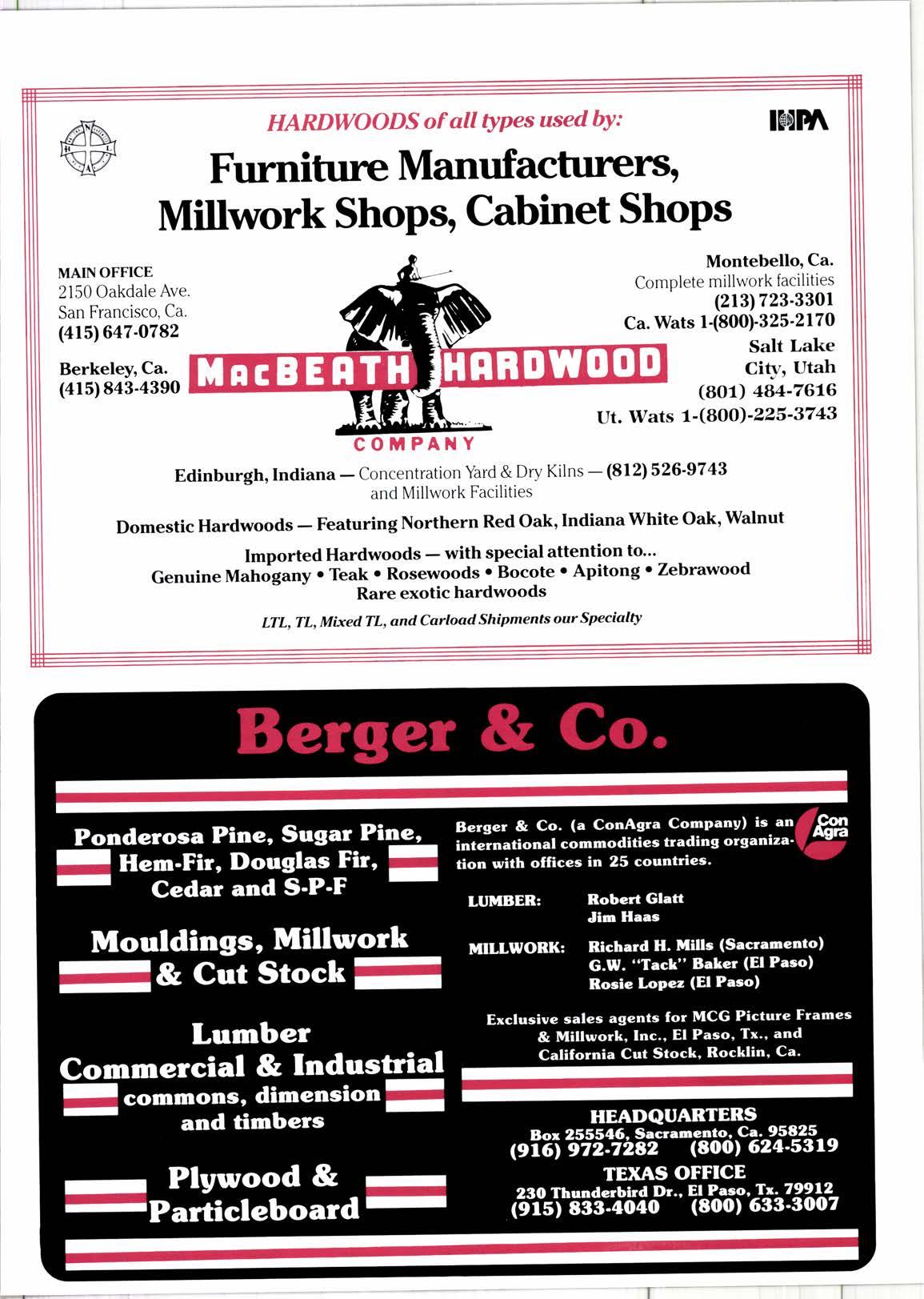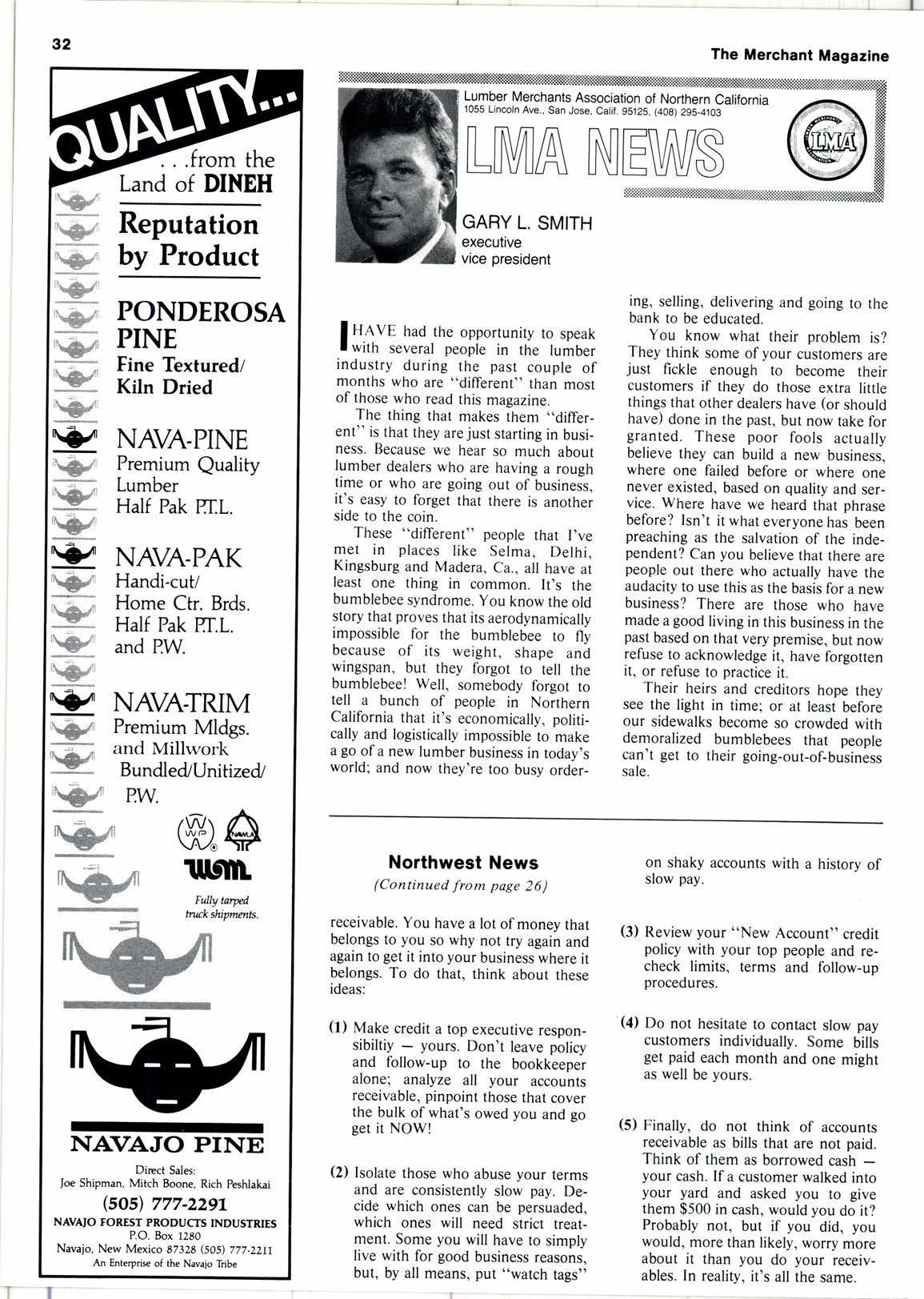
3 minute read
Furniturc Manufacturelrit Millwork Shops, Cabinet ShoPs
Montebello, Ca.
MAINOFFICE
2150 Oakdale Ave.
San Francisco, Ca.
(4151647-0782
Berkeley, Ca.
(415) 843-43e0
ridngrg COiIPANY
Complete millwork facilities
(213) 723-3301
Ca. Wats l-(S00)'325'217 O Salt Lake Citv. Utah
(so1) 484-7616
Ut. Wats 1"(SOO)'225-37 43
Edinburgh,Indianaconcentration Yard & Dry Kilns - (812) 526'9743 and Millwork Facilities
Domestic Hardwoods - Featuring Northern Red Oak, Indiana White Oak, Walnut
Imported Hardwoodswith special attention to"'
Genuine Mahogany ' Teak ' Rosewoods 'Bocote o Apitong ' Zebrawood Rare exotic hardwoods
LTL, TL, Mked TL, and Carload Shipments our Specialty
Land of DINEH
Reputation by Product PONDEROSA
PINE
Fine Textured/ Kiln Dried
NAVA.PINE
Premium Quality
Lumber
Half Pak FTL.
NAVA.PAK
Handi-cut/ Home Ctr. Brds.
Half Pak PLL. and PW.
NAVATRIM
Premium Mldgs. and Millwork
Bundled/Unitized/ Py/.
GARY L. SMITH executive vice president
I Have had rhe opportunity to speak I with several people in the lumber industry during the past couple of months who are "different" than most of those who read this magazine.

The thing that makes them ..different" is that they arejust starting in business. Because we hear so much about lumber dealers who are having a rough time or who are going out of busineJs, it's easy to forget that there is another side to the coin.
These "different" people that I've met in places like Selma. Delhi. Kingsburg and Madera, Ca., all have at least one thing in common. It's the bumblebee syndrome. You know the old story that proves that its aerodynamically impossible for the bumblebee to flv because of its weight, shape and wingspan, but they forgot to teil the bumblebee! Well, somebody forgot to tell a bunch of people in Northern California that it's economically, politically and logistically impossible to make a go of a new lumber business in todav's worldt and now they're too busy ordlr-
Northwest News
(Continued from page 26) receivable. You have a lot of monev that belongs to you so why not try again and again to get it into your business where it belongs. To do that, think about these ideas:
(1) Make credit a top executive responsibiltiy - yours. Don't leave policy and follow-up to the bookkeeper alone; analyze all your accounts receivable, pinpoint those that cover the bulk of what's owed you and go get it Now!
(2) Isolate those who abuse your terms and are consistently slow pay. Decide which ones can be persuaded, which ones will need strict treatment. Some you will have to simply Iive with for good business reasons, but, by all means, put "watch tags" ing, selling, delivering and going to the bank to be educated. on shaky accounts with a history of slow pay.
You know what their problem is?
They think some of your customers are just fickle enough to become their customers if they do those extra little things that other dealers have (or should have) done in the past, but now take for granted. These poor fools actually believe they can build a new business, where one failed before or where one never existed, based on quality and service. Where have we heard that ohrase before? lsn't it what everyone hai been preaching as the salvation of the independent? Can you believe that there are people out there who actually have the audacity to use this as the basis for a new business? There are those who have made a good living in this business in the past based on that very premise, but now refuse to acknowledge it, have forgotten it, or refuse to practice it.
Their heirs and creditors hope they see the light in time; or at least before our sidewalks become so crowded with demoralized bumblebees that people can't get to their going-out-of-business sale.
(3) Review your "New Account" credit policy with your top people and recheck limits, terms and follow-up procedures.
(4) Do not hesitate to contact slow pay customers individually. Some bills get paid each month and one might as well be yours.
(5) Finally, do not think of accounts receivable as bills that are not paid. Think of them as borrowed cashyour cash. If a customer walked into your yard and asked you to give them S500 in cash, would you do it? Probably not, but if you did, you would, more than likely, worry more about it than you do your receivables. In reality, it's all the same.










